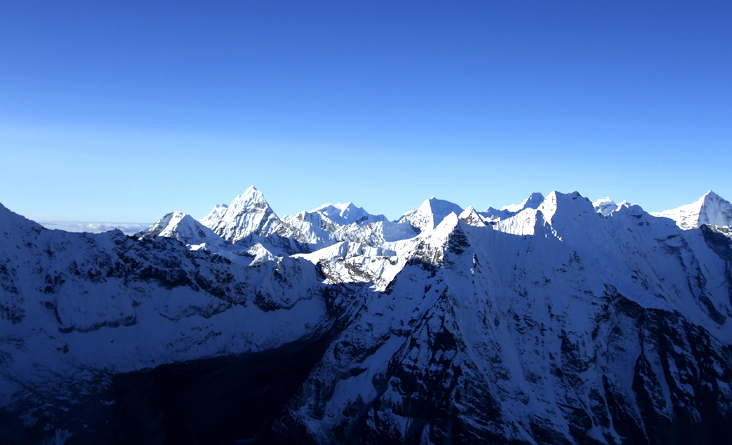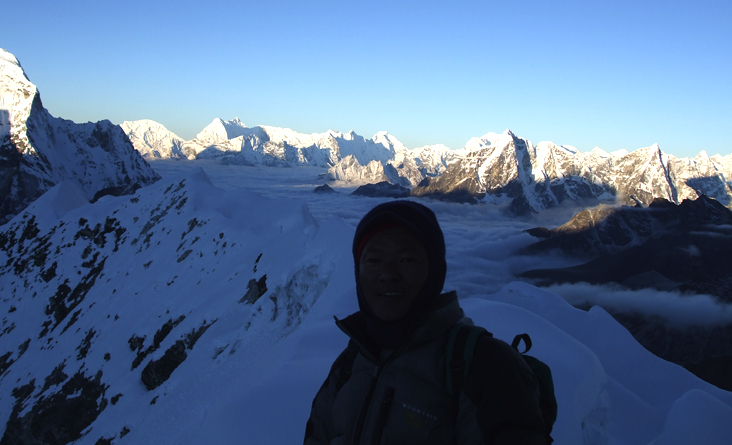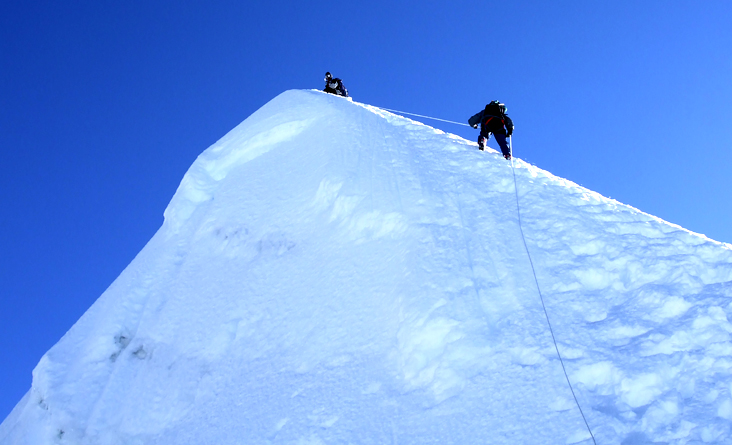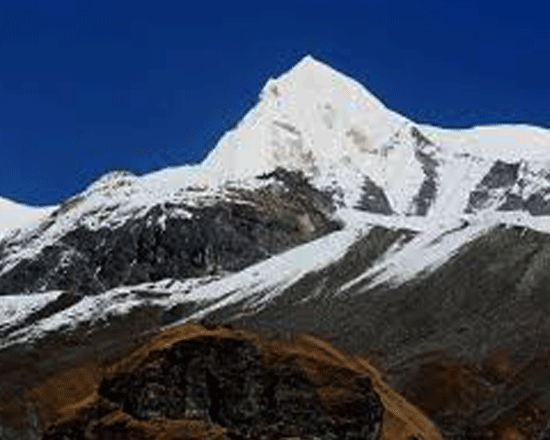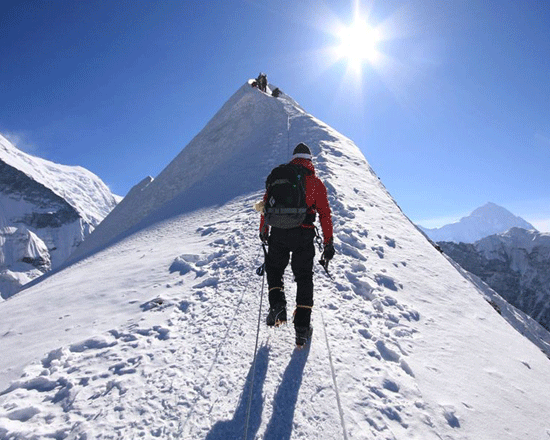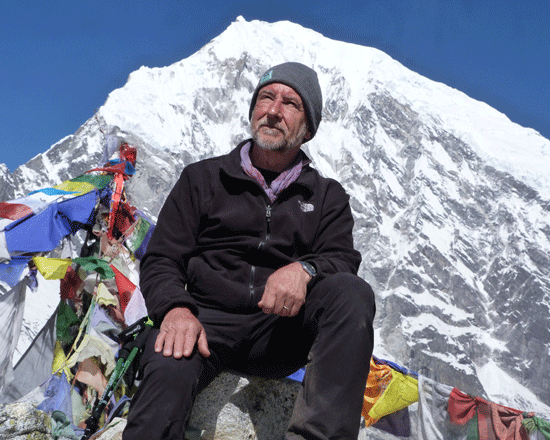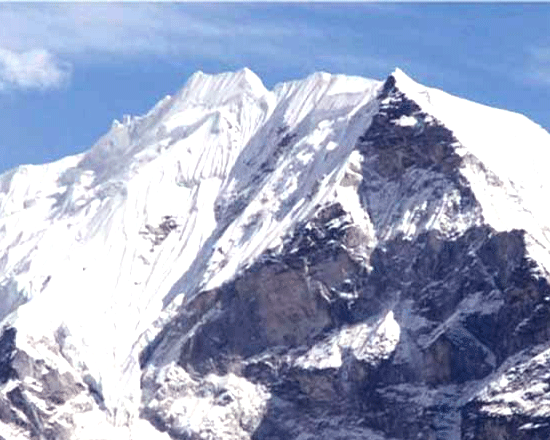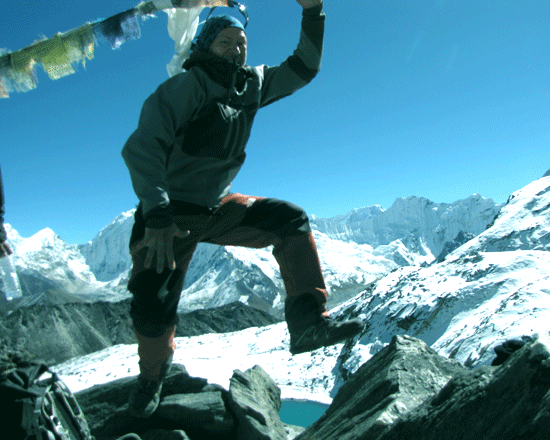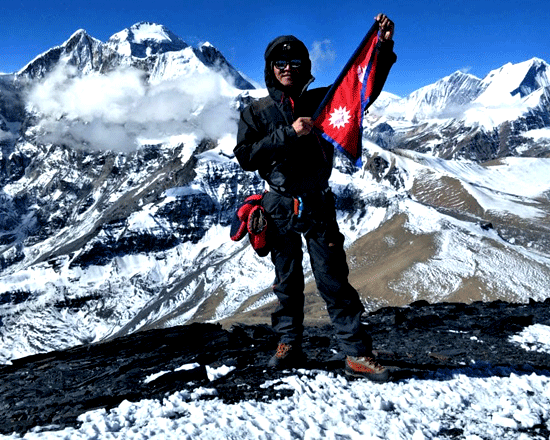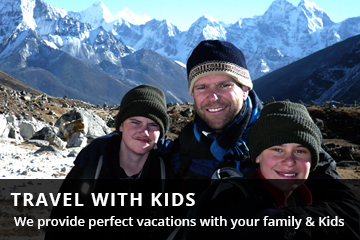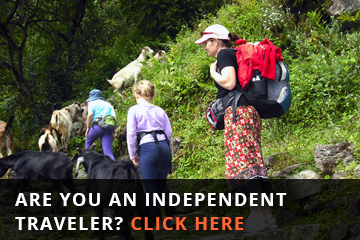Island Peak climbing From Chhukung
Island Peak climbing From Chhukung
Peak Climbing In NepalTrip Facts
This is challenging and technical Trekking, climbing of Nepal, you most have to physically fit and mentally prepare, off the beaten trails, camping or challenging high passes Treks, at this level can he arranged for periods of 18 to 32 days. Typically, a gradual ascent through a green river valley will lead you up to a number of high passes, where you will reach the altitude of 5416m. Often times, you will get a close insight into the Tibetan culture. Participants should expect to trek above 5416m/17872ft. or climbing 6540m.
Mode of Travel : Flight/Land Hold Your Guide : Pemba sherpa100%
Overview
Island Peak Climb Join From Chhukung – Base Camp
The 3-day Island Peak Climbing package, organized from Chhukung, stands as an optimal choice for trekkers who have embarked on the EBC, Gokyo, and 3 Passes Trek in the Everest region. If you’re keen on joining a group for the Island Peak ascent, our assistance is at your disposal to help you achieve your summiting goal. To top the 6,173-meter-high Island (Imja Peak) and leave your mark on its pinnacle.
Island Peak is an adventure climbing peak, an ultimate journey that appeals to every mountaineering enthusiast who undertakes the Everest Base Camp trek.
Climbing Island Peak provides an excellent opportunity for individuals aged 18 to 75 to conquer this impressive 6,173-meter-high summit. First, the challenge involves a mixed rock and ice wall at an approximately 45-degree slope. Then, this leads to a narrow ridge after the high camp and just before donning crampons. Nevertheless, the rewards of Island Peak are undoubtedly worth the exertion. Notably, the physical demands of Island Peak climbing are relatively less daunting than those of Ama Dablam.
Journey to Island Peak
The journey to Island Peak climbing from Chhukung follows a trek through the Khumbu region. Whether you approach from Jiri, Phaplu, Lukla, or any other corner of the Everest region, you’ll first undergo acclimatization by traversing various passes. These passes includes Renjo La Pass (5,338m), Chola Pass (5,420m), Kala Patthar (5,545m), and Kongma La Pass (5,535m). Furthermore, beyond the thrill of Island Peak climbing, you’ll also encounter untouched Sherpa villages and tranquil monasteries, each holding profound memories from your earlier treks.
History of Island Peak Climbing
Island Peak was first climbed in 1953 by a British expedition that was preparing for the first ascent of Mount Everest. The team included famous climbers such as Charles Evans, Alf Gregory, Charles Wylie, and Tenzing Norgay, who played a crucial role in the successful ascent of Everest by Edmund Hillary and Tenzing Norgay later that year. The ascent of Island Peak served as a training climb and acclimatization exercise for the team.
- “Island Peak”: The peak was named Island Peak by Eric Shipton’s party in 1952 because it appears as an island in a sea of ice when viewed from Dingboche.
- “Imja Tse”: The mountain was later renamed Imja Tse in 1983, though it is still commonly referred to as Island Peak.
Climbing Route Development
-
- Original Route: The original route taken by the 1953 British expedition involved a straightforward climb up the southwest ridge.
- Current Routes: The most commonly used route today starts from the base camp in the Imja Valley. Initially, climbers ascend via the glacier and then proceed by following the southwest ridge to the summit. Along the way, this route involves navigating through crevasses. Next, it requires climbing a steep headwall, and finally, it culminates in traversing a narrow summit ridge.
Notable Ascents and Expeditions
- Training and Acclimatization: Over the years, Island Peak has been used by many expeditions as a training and acclimatization climb for higher peaks such as Everest and Lhotse.
- Guided Expeditions: Numerous guided expeditions are organized each year, making it accessible to climbers with varying levels of experience. These expeditions provide necessary support, including guides, porters, and equipment.
Island Peak death rate
It is considered a safe mountain to climb (the Island Peak reaches 6,189 m), and mountain climbers can reach its summit with ease. The number of successful summits at Island Peak each year is increasing. Islands Peak holds a very low death rate compared to other climbing peaks, which is seldom noticed by them as they are so careful.
Best time to climb Island Peak.
Best time to climb Island Peak, the Island Peak can be climbed throughout the year, except during the monsoon season (June to August). Spring (March to May) and autumn (September to November) are the best seasons to climb the Island Peak. Clear skies and moderate temperatures are the virtues of these months for summiting.
As well as being easy to ascend, the winter season is also acceptable for those climbers who are experienced and can tolerate the cold. The rewards of this Island peak, if climbed in spring, are capturing the clear scenery, justifying views, and comfortable climbs.
Island peak Climbing difficulty
Island Peak is not easy to climb; it is difficult to climb the peak, but you can make it easier if you spend more days trekking into and on the mountain. It is necessary to acclimatize to the lower oxygen levels lower down on the trail. Island Peak’s summit statistics indicate that most people who attempt the climb do not reach the summit.
The Nepal Wilderness Trekking agency organizes Island Peak Climbing trips from Chhukung to Chhukung within a two-night, three-day package trip. Meet our staff in Chhukung, and they will explain a few things to you regarding the Island Peak climbing trip. The trip is open to anyone who has completed their Gokyo Valley Trek or Everest Base Camp and the 3 passes trek. Following the summit of the peak, our guide will take you to Chukung, where you can plan your next adventure.
Most of our members join the Chhukung as individuals or group trekkers. Our team is dynamic and well-worked. We can build successful and safe summits on Island Peak.
Is it possible to match your departure date from Chhukung?
If you are planning to visit the island peak from September to December and March to June, we offer daily departures. During peak season, our staff and climbing guides will be at the island peak base camp. One of our assistants is always in the Chhukung to gather the group and lead the Island Peak Base Camp.
Where can we find your team in Chhukung?
The day before you depart from Kathmandu, we will provide you with the climbing permit and specific information about Chhukung Lodge, where our staff will be ready to receive you. As part of this process, we will send your climbing permit number and your name details to you via WhatsApp.”
Is it possible to rent climbing gear in Chhukung?
In Chhukung, you have the option to rent nearly all the climbing gear required for peak climbing. Our staff will assist you in obtaining the necessary equipment for your peak climbing adventure on the island. We offer essential gear such as crampons, harnesses, ice axes, screws, carabiners, snow anchors, main ropes, and lead ropes.
Island Peak climbing itinerary
Day 01: Trek to Chhukung 4750 m. Reach after walking a couple of hours via Khong Mala pass or from Dingboche as per your itinerary (our staff will meet you in Chhukung sometime evening at your lodge)
Day 02: Hike to Island Peak Base Camp for 3 hours (5,200 m). Our climbing guide will teach you 2 hours of courses about how to use the crampons, belay ropes, emergency safety, etc.
Day 03: Base Camp to Summit 6189 m Island Peak and back to Chhukung. If bad weather or being late to get back to the base camp, then today will be in the base camp with our staff.
Island Peak climbing cost
The Island Peak climbing cost depends on the season. Additionally, climbing permits, base camp accommodations, climbing sherpas, and climbing gear are included. Climbing Island Peak follows the classic base camp route to Dingboche. You will also get to walk through Sherpa villages before and after climbing Island Peak.
(Video of Island Peak Climbing)
Detail Itinerary
- Day 01: Trek to Chhukung 4750m. Reach After walking a couple of hours via Khong Mala pass or from Dingboche as per your itinerary (our staff meet you in Chhukung some of the evening at your lodge)
- Day 02: hike to Island Peak Base Camp for 3 hours (5,200m). Our climbing guide will teach you 2 hours of courses about how to use the crampons, belay ropes, emergency safety, etc.
- Day 03: Base Camp to Summit 6189m Island peak and back to Chhukung, if bad weather or late to get back to the base camp, then today will be spent in the base camp with our staff.
Cost Included
- Kitchen Equipment: Trekking tents, Dining tent, Kitchen Tent, Toilet Tent, Table and chairs, Mattresses during the trekking & Peak climbing period.
- Climbing Rope, Ice screws, Snow anchor.
- Staff: 1 Cook, 1 Kitchen, one climbing guide, and a helper. Base Camp Base
- insurance for Nepalese teams.
- Our service charge.
- Equipment Fees for the climbing guide
- Climbing peak permit
- meals from Base Camp to Base Camp
- Climbing Gear such as Crampons, Harness, Ice Axe, Screw gears Karabiners
Cost Excluded
- climbing boot
- Emergency Rescue evacuation
- Sleeping bag
- Personal expenses
- Tipping (Tips) for staff
| Trip Dates | Trip Price | Confirmed Pax | Trip Status | |
|---|---|---|---|---|
| Fixed Departures will be added soon! | ||||

